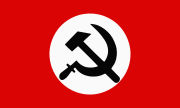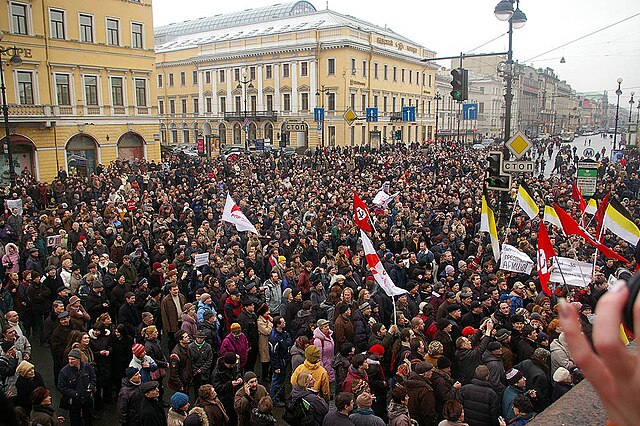Loading AI tools
Political party in Russia From Wikipedia, the free encyclopedia
The National Bolshevik Party (NBP; Russian: Национал-большевистская партия, romanized: Natsional-bolshevistskaya partiya) operated from 1993 to 2007 as a Russian political party with a political program of National Bolshevism. The NBP became a prominent member of The Other Russia coalition of opposition parties.[13] Its members are known as Nazbols (Russian: нацболы).[14]
National Bolshevik Party Национал-большевистская партия | |
|---|---|
| Abbreviation | NBP, Nazbols |
| Leader | Eduard Limonov |
| Founders | Eduard Limonov[1] Aleksandr Dugin[2] Egor Letov |
| Founded | 1 May 1993 |
| Legalised | 16 August 2005[3] |
| Banned | 7 August 2007[4] |
| Succeeded by | The Other Russia National Bolshevik Front[5] Eurasia Party |
| Headquarters | Bunker NBP, st. Maria Ulyanova, 17, building 1, Moscow, Russia[6] |
| Newspaper | Limonka |
| Membership | |
| Ideology | National Bolshevism Russian ultranationalism Neo-Sovietism Russian irredentism Anti-Western sentiment Left-wing nationalism Soviet patriotism Euroscepticism Anti-establishment |
| Political position | Syncretic[nb] |
| Coalition | National Salvation Front (1992–1993) The Other Russia (2006–2010) |
| Colours | Red White Black |
| Slogan | "Russia Is Everything, The Rest Is Nothing!" (motto) "Yes, Death!" (greeting)[7] |
| Anthem | "Anthem of the National Bolshevik Party",[8] by Dmitri Maximovich Shostakovich[9] |
| Party flag | |
 | |
| Website | |
| eng.nbp-info.ru | |
^ nb: Within the context of National Bolshevism, which is described as "a peculiar form of Marxist–Leninist etatism that fused the pursuit of communist ideals with more etatist ambitions reminiscent of tsarist 'Great Power' (velikoderzhavnye) traditions",[10] the party is seen as an attempt by Limonov and Dugin to try to unite left-wing and right-wing extremists on the same platform,[11] and as having used, in reference to one of the party's mobilizations, "a bizarre mixture of totalitarian and fascist symbols, geopolitical dogma, leftist ideas, and national-patriotic demagoguery."[12] | |
There have been smaller NBP groups in other countries. Its official publication, the newspaper Limonka, derived its name from the party leader's surname and from the idiomatic Russian word for a grenade. The main editor of Limonka was for many years, Aleksey Volynets. Russian courts banned the organization and it never officially registered as a political party. In 2010, its leader Eduard Limonov founded a new political party, called The Other Russia of E. V. Limonov.[15]

The NBP believes in the National Bolshevik ideas that arose during the Russian Civil War, such as those from Nikolai Ustryalov, who came to believe that Bolshevism could be modified to serve nationalistic purposes. His followers, the Smenovekhovtsy, who then came to regard themselves as National Bolsheviks, borrowed the term from Ernst Niekisch, who was a German politician initially associated with left-wing politics and later the National Bolshevik ideology.[10]
The NBP has denied any links to fascism, stating that all forms of antisemitism, xenophobia, and racism were against the party's principles.[16] The NBP has historically defended Stalinism, although later on the party said it did not wish to re-create that system.[16] The party is described as a mixture of far-left and far-right ideology, including among its members Sovietism' nostalgics as well as skinheads, with the hammer and sickle (which replace the swastika) in a white circle on a red background as party's flag.[17]
On 29 November 2004, participants of the general congress of the NBP adopted a new party program. According to the program, "the main goal of the National Bolshevik Party is to change Russia into a modern, powerful state, respected by other countries and peoples and beloved by its own citizens" by ensuring the free development of civil society, the independence of the media, and social justice.[18] The NBP was highly critical of Vladimir Putin's government and argued that state institutions, such as the bureaucracy, the police, and the courts, were corrupt and authoritarian.[19]

Since its formation, the National Bolshevik Party had relationships with Russian counterculture.[20] National Bolsheviks often used shock aesthetics from the punk subculture in their propaganda.[21][22] NBP attracted a significant number of artists, punk musicians and rock bands.[23][24]
Some Western critics commented on its heavy use of totalitarian and fascist symbols and what they called its "national-patriotic demagoguery",[12] and academics have described the group as neo-fascist.[25] In the Russian media, the National Bolshevik Party was usually referred to as a far-left youth movement; however, some critics (including ex-members) allege that the NBP is an organisation dedicated to carry out a colour revolution in Russia.[26][27][28]
The symbols of the National Bolshevik Party are a combination of Soviet, Nazi, and Imperial Russian symbols; the party nonetheless denied any link to fascism and Nazism.[16]

In 1992, Eduard Limonov founded the National Bolshevik Front (NBF) as an amalgamation of six minor groups.[29] Aleksandr Dugin was among the earliest members and was instrumental in convincing Limonov to enter politics. The party first attracted attention in 1992 when two members were arrested for possessing grenades. The incident gave the NBP publicity for a boycott campaign they were organizing against Western goods.[30] The NBF joined forces with the National Salvation Front, which was a broad coalition of Russian communists and nationalists.[31]
The FNS was one of the leading groups involved in the 1993 Russian constitutional crisis, and Limonov participated in the clashes near the White House in Moscow on the side of the Anti-Yeltsin opposition.[32] When others within the coalition began to speak out against the NBF, it withdrew from the alliance.[33] On 1 May 1993, Limonov and Dugin signed a declaration of founding the NBP.[34] On 28 November 1994, Limonov founded the newspaper Limonka, the official organ of the NBP.
In 1998, Dugin left the NBP as a result of a conflict with other members of the party.[35] This led to the party moving further left in Russia's political spectrum, and led to members of the party denouncing Dugin and his group as fascists.[12] Dugin later established the Eurasia Party, that endorses a significantly more radical nationalist and socially conservative view of National Bolshevism.[36]
Limonov and some National Bolsheviks were jailed in April 2001 on charges of terrorism, the forced overthrow of the constitutional order, and the illegal purchase of weapons. Based on an article published in Limonka under Limonov's byline,[37] the government accused Limonov of planning to start an armed insurgency in Kazakhstan.[38]
After the arrest of the leader, members of the party started activities (including direct action stunts) against Putin's government.[39] In 2002, members of the NBP participated in a common demonstration of far-left forces in a Moscow a demonstration called Anticapitalism-2002.[40] National Bolsheviks clashed with riot police.[41] In 2003, Limonov was released from Lefortovo Prison.[42]

Since 2004, the NBP has formed alliances with other opposition forces, both far-left and right-wing. In 2004, Limonov signed the declaration titled "Russia without Putin."[43] In August 2006, an anti-Limonovist faction of the NBP that was right-wing formed the National Bolshevik Front.[44]
The NBP became a prominent member of The Other Russia coalition of opposition parties.[13] In 2007, the NBP members took part in a Dissenters' March and other subsequent demonstrations against the government.[45]

The NBP was banned by a Russian lower court in June 2005; the Russian Supreme Court overturned that ban on 16 August 2005. In November 2005, the Russian Supreme Court upheld a ban on the party on the grounds that the NBP called itself a political party without being registered as such.[citation needed] On 7 August 2007, the Russian Supreme Court confirmed the decision of the Moscow City Court of 19 April to ban the party[46] as an extremist organization.[47]
In 2009, NBP members took part in Strategy-31, a series of civic protests in support of the right to peaceful assembly.[48][49] In July 2010, the National Bolsheviks founded a new political party, The Other Russia of E. V. Limonov.[15]
The NBP often used non-violent direct-action stunts, mostly against prominent political figures.[39][50]
On 24 August 1999, the NBP occupied a tower of the Club of Military Seamen in Sevastopol on Ukraine's Independence Day. Some of the operatives were sentenced to prison.[51][52] During the Prince Charles' tour of the Baltic states in 2001, a member of the Latvian branch of the NBP hit Charles' face with a flower in an act of protest against the war in Afghanistan.[53][54] During the 2002 Prague summit, National Bolsheviks threw tomatoes at George Robertson to protest against the extension of NATO and American imperialism.[55]
On 3 March 2004, National Bolsheviks occupied the United Russia headquarters in Moscow and protested against government policy.[56] On 22 June 2004, National Bolsheviks occupied Germany's Trade Embassy in Moscow on the anniversary of the German invasion of the Soviet Union. They hung a banner with an inscription "Never forget! Never forgive!"[57] On 2 August 2004, a group of National Bolsheviks occupied the office of the Health and Social Development Ministry building in Moscow to protest against the social benefits reform.[58] Police arrested most of the participants, and on 12 December 2004, seven National Bolsheviks were each sentenced to five years in prison.[59] On 14 December 2004, NBP members occupied the presidential-administration visitors' room to protest against government policy. Police arrested thirty-nine National Bolsheviks, with many of them being sentenced to prison.[60]
On 25 September 2006, National Bolsheviks occupied the Ministries of Finances building in Moscow to protest against liberal economic policy.[61][62][63]
The National Bolshevik Party founded branches across the post-Soviet states. Relatively strong branches of the party existed in Latvia, Ukraine, and Belarus. Several small groups often made up of Russian immigrants that are named National Bolshevik Party have existed in countries across Europe and North America.[64] Most of them did not have official registration.
Latvia's NBP has had members hold office in Riga,[65] and has executed notable publicity stunts, but it remains largely marginal there.[66] The Latvian branch has been led by Vladimir Linderman and Aijo Beness.[67][68][69][70][71] In 2003, Linderman was accused of storing explosives and of calling for the overthrow of the political system.[72] He left Latvia and moved to Russia. In 2005, during the visit of George W. Bush in Latvia, local national Bolsheviks and the Vanguard of Red Youth organized meetings "against American imperialism". Police broke up a demonstration and arrested its participants.[73][74] The Latvian NBP was also active in anti-capitalist demonstrations and in anti-Nazi blockades during Remembrance Day of the Latvian Legionnaires.[75][76]
Largely based in Eastern Ukraine, the NBP initially joined forces with another small parties and signed a "Declaration of the Kiev Council of Slav Radical Nationalists" together with Ukrainian nationalists.[77] Later, Ukrainian national Bolsheviks were active in demonstrations against Ukrainian nationalists on the anniversary of the founding of the Ukrainian Insurgent Army.[78] National Bolsheviks also organized actions against the rapprochement of Ukraine–NATO relations.[79] During the Orange Revolution, the Ukrainian NBP decided to not support any side. National Bolsheviks also formed armed troop interbrigades and participated in the 2014 pro-Russian unrest in Donbass.[80][81]
In September 2021, the European Court of Human Rights found that there was a violation of Article 11 of the European Convention on Human Rights on account of the dissolution of the NBP association in 2004 and on account of the refusal to register the NBP political party, and awarded €10,000 jointly to the children of Limonov and four of his followers.[82]
Until banning of the NBP in 2007
By other authors
Seamless Wikipedia browsing. On steroids.
Every time you click a link to Wikipedia, Wiktionary or Wikiquote in your browser's search results, it will show the modern Wikiwand interface.
Wikiwand extension is a five stars, simple, with minimum permission required to keep your browsing private, safe and transparent.